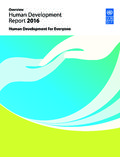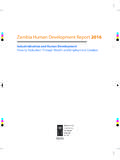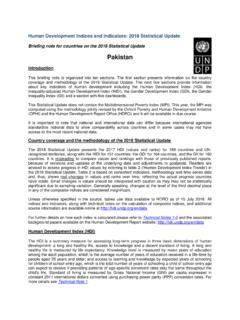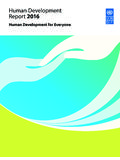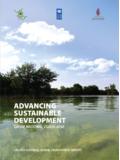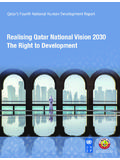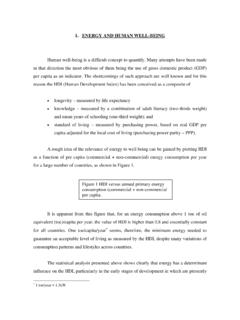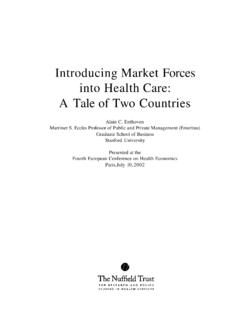Transcription of Transforming Global Governance for the 21st Century
1 OCCASIONAL PAPER 2013/09 Human Development Report OfficeHuman Development Report OfficeUnited NationsDevelopment ProgrammeUnited NationsDevelopment ProgrammeTransforming Global Governance for the 21st Century by Ngaire Woods, Alexander Betts, Jochen Prantl and Devi SridharUNDP Human Development Report Office304 E. 45th Street, 12th FloorNew York, NY 10017, USATel: +1 212-906-3661 Fax: +1 212-906-5161 2013by the United Nations Development Programme1 UN Plaza, New York, NY 10017, USAAll rights reserved. No part of this publication may be reproduced, stored in a retrieval system or transmitted, in any form or by any means, electronic, mechanical, photocopying, recording or otherwise without prior permission. This paper does not represent the official views of the United Nations Development Programme, and any errors or omissions are the authors Woods is Dean of the Blavatnik School of Government at Oxford University.
2 She is also Professor of International Political Economy and fellow in Politics and International Relations at University College, Oxford, and Director of the Global Economic Governance Programme at the Department of Politics and International Relations and Centre for International Studies of the University of Oxford. She teaches for the TRIUM Global Executive MBA programme, an alliance of NYU Stern, the London School of Economics and the HEC School of Management. Her research focuses on Global economic Governance , the challenges of globaliza-tion, Global development and the role of international institutions. Her recent books include The Politics of Global Regulation (with Walter Mattli, OUP, 2009), Networks of Influence? developing countries in a Networked Global Order (with Leonardo Martinez-Diaz, OUP, 2009), The Globalizers: the IMF, the World Bank and their Borrowers (Cornell University, 2006), Exporting Good Governance : Temptations and Challenges in Canada s Aid Program (with Jennifer Welsh, Laurier University, 2007), and Making Self-Regulation Effective in developing countries (with Dana Brown, OUP, 2007).
3 She has previously published The Political Economy of Globalization (Macmillan, 2000), Inequality, Globalization and World Politics (with Andrew Hurrell, OUP, 1999), and Explaining International Relations since 1945 (OUP, 1986).UNDP Human Development Report Office OCCASIONAL PAPER 2013 /091 Transforming Global Governance for the 21st CenturyNGAIRE WOODS, ALEXANDER BETTS, JOCHEN PRANTL AND DEVI SRIDHAR ABSTRACTThis paper examines the transformation of Global Governance triggered by the rise of the Global South. Section 1 analyses the Global Governance of finance, the area in which emerging economies have been most open in challenging existing institutions. Section 2 assesses changes in the Global Governance of security. Power shifts have led to a diffusion of preferences and strate-gies that reflect a growing contestation of the patterns and understandings of collective action in the Global security regime.
4 Section 3 maps the Global Governance of health. Section 4 examines changes in the Global Governance of migration, given the significant growth in the number of migrants. Following from this analysis, the paper offers three principles that might guide thinking about transformation: pluralism, where national, regional and Global Governance systems work in concert; strengthened multilateral processes and the updating of existing international organizations; and stronger accountability to wider groups of governments and rise of the Global South is Transforming Global govern-ance. It is creating new demands for multilateral institutions and jumpstarting regionalism. The result is a new range of strategic choices available to developing countries , and a new imperative to reform and reinvigorate multilateral and regional organizations.
5 This paper explores the transforma-tion of Governance in four sectors finance, health, migration and security and highlights the implications for developing countries . In each area, developing countries have clear and powerful collective interests. There are also challenges for Global Governance . At one end is the relatively well-institu-tionalized area of finance, where reforming existing insti-tutions is key. At the other end is migration, where Global negotiations are needed, and institutions barely exist. Over a decade ago, in the wake of the September 11th terrorist attacks, the 2002 Human Development Report analysed prospects for deepening democracy at the Global level. The report noted a rise in pluralism in world politics, as well as the success of civil society activists in trade unions, non-governmental organizations (NGOs) and transnational campaigns in achieving changes in the Global Governance of debt relief, access to essential medicines and the enforcement of human rights.
6 Equally, the report highlighted the need to reform international institutions by strengthening repre-sentation in them, creating fairer decision-making rules and increasing accountability. Today, Global Governance has a new challenge. The rise of the Global South and a shift in Global power towards emerging economies China, in particular has become more obvious. China and other emerging economies have forged deeper and stronger economic relations with neighbours and across the developing world. They have rapidly expanded their Global markets and production. As they rely more on Global market access, they will increasingly require Global rules to protect that access. Global rules can be made in formal, multilateral institu-tions, or (as became very popular in the 1990s and 2000s) in informal, standard-setting networks of private and non-governmental actors.
7 Emerging economies are likely to favour the former. Brazil, China, India and the Russian Federation are state-centred in their own Governance , and guard their sovereignty in international relations. Multilateral institu-tions can formalize representation and decision-making, and respect the power and processes of national multilateral institutions are not fit for this purpose, however. For decades, powerful governments have 9 UNDP Human Development Report Office OCCASIONAL PAPER 2013 /092 Transforming Global Governance FOR THE 21ST CENTURY9sidestepped the failings of major international agencies. Instead of dealing with out-of-date representation, vested interests, poor leadership and stagnating bureaucracy, they simply cre-ated new initiatives to deliver what international organiza-tions could not. Among the many examples given in this paper are the proliferation of voluntary standards in finance, which substituted for Global regulation; the emergence of the Global Fund to Fight AIDS, Tuberculosis and Malaria (GFATM), in place of action through the World Health Organization (WHO); the rise of informal groups in the United Nations to bypass a gridlocked or deadlocked UN Security Council; and regional consultative processes on migration and security to make up for a failure to take forward Global negotiations.
8 In each case, governments have sought to avert the slow, cumber-some processes of multilateral institutions by creating more nimble, informal networks and private-public partnerships. They must now turn their attention back to the organizations. The rise of the Global South is injecting a new urgency into reforming international institutions, as is most clear in Global finance. Faced with Global crisis, the status quo powers the Group of 7 (G7) finance ministers have had to reach out to emerging economies, including them in the Group of 20 (G20), requesting resource contributions and agreeing to give them more voice in relevant international organizations. However, emerging economies are not yet confident that multilaterals will work for their interests as much as for the interests of Europe and the United States, so they are also pursuing national, bilateral and regional strategies.
9 As we will see below, instead of relying on the International Monetary Fund (IMF), to which they are now contributing more, they are also amassing their own foreign exchange reserves ( self-insurance ), using bilateral credit lines in moments of vulner-ability and reinforcing regional arrangements. In trade, where international rules are crucial, countries have been frustrated by the stalemated Doha negotiations, and have resorted to bilateral and regional negotiations, as in Asia-Pacific. New international negotiating strategies have emerged, such as through the Group of 6 (G6) involving Australia, Brazil, India, Japan, the United States and the European Union. Shifts are also apparent in climate change negotiations. Collective action is required to reduce greenhouse gas emis-sions, adapt to a changing climate, share new technologies and secure related financial resources.
10 While multilateral negotia-tions have continued in one form or another for nearly two decades, many new developments are beginning to redefine negotiating strategies and the Global climate regime. Choices of negotiating forums are shifting from the UN Framework Convention on Climate Change (UNFCCC) to smaller groups such as the Major Economies Forum on Energy and Climate (MEF), the G20 and US-BASIC (the United States and Brazil, China, India and South Africa). Another sign of change is the move from commitments based on top-down targets to bot-tom-up mitigation actions by individual countries . Bilateral and regional agreements are becoming increasingly important as countries negotiate deals to cooperate on technology devel-opment or establish region-specific carbon markets. Links with issues such as trade, intellectual property, health and migration, and financing are more four areas discussed in this paper finance, security, health and migration have been traditionally affected by North-South divisions, with the Global South viewing govern-ance as dominated by the North.
